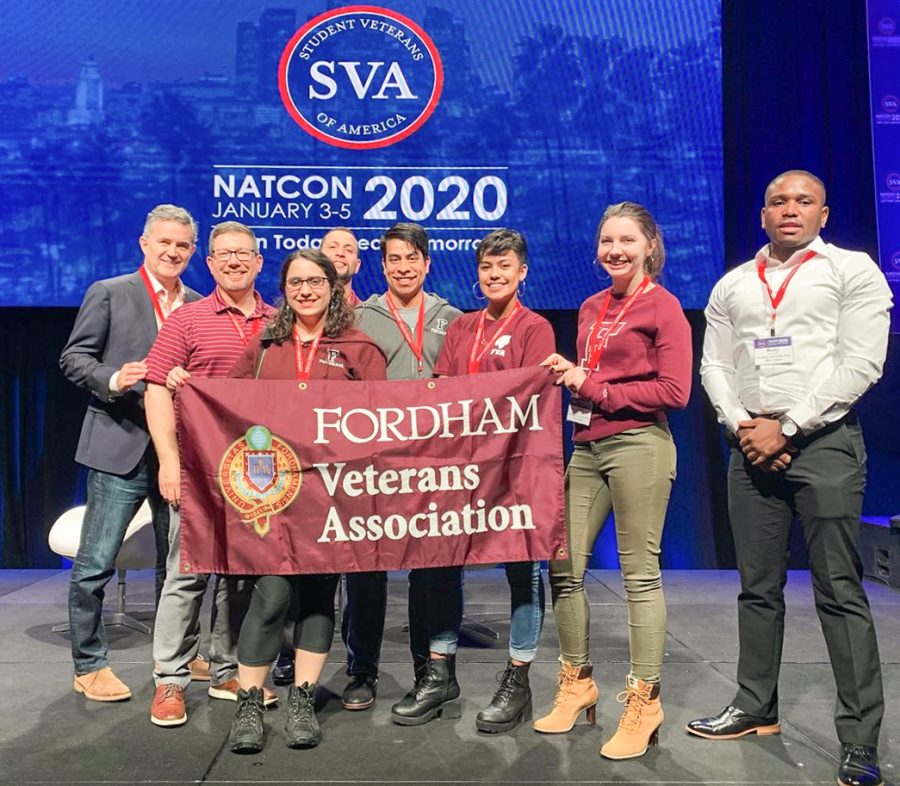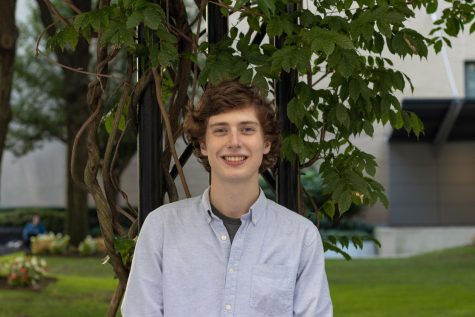Expanded Community Center Welcomes Student Veterans
COURTESY OF SVAF
Fordham veterans attended NatCon- a national convention of student veterans across the country to meet and share their experiences
January 22, 2020
Of the 468 student veterans who attend Fordham, nearly all of them volunteered after the Sept. 11 attacks. As the veterans leave service to begin their studies, the Veterans Center serves these former servicemen and -women as they reenter civilian life. In November 2019, the Veterans Center was expanded and now resides in room 145 of the 140 West Building to include more office space and a lounge for student veterans to congregate.
Matthew Butler, director of military and veterans’ services for the Student Veterans of America at Fordham (SVAF), said that the Veterans Center acts as both a meeting place and resource for student veterans to continue their studies at Fordham and act as a space for veterans to socialize.
Butler described how student veterans face unique challenges when returning to civilian life, and why support systems like the Fordham Veterans Center are so important. “The military is a culture that you join, it kind of wraps around you and then you leave; it’s like leaving your family,” Butler said. “As soon as they leave, that support ends and they have to figure out how to bridge those different networks and systems and bureaucracies to get to a point where they’re in school.”
For student veterans like Damaris Gonzalez, a first-year junior at Fordham, the Veterans Center is a crucial link that connects her to Fordham. “We’re older than a lot of people in our classes. You don’t really relate to these people who are 18, 19 years old, so it’s hard to talk to them or even ask to hang out in that sense,” she said.
“It’s cooler to go to the Veterans Center and see people your age — you relate to them,” Gonzalez said. “It’s easier just because we have that space and we all can meet up,” she continued.
Fellow student veteran Diego Garcia, a sophomore whose service ended in September, also finds comfort in the Veterans Center. “Fordham’s definitely paved the way in a particular direction where I can see what I want in life, and the transition is probably the easiest as it could be,” he said.
Comparing the role of the Veterans Center to that of high school college counselors, Butler explained how both offer insight and support to their students with continuing their education.
“It wasn’t something that you just had to figure out; you had people showing you the path,” Butler said, referring to the college admissions process in which college counselors in high school assist prospective undergraduate students. “Think if you were applying for school but you were outside that support network. That’s really what a lot of veterans experience when they transition from the military.
“With the expanded vet center,” Butler continued, “We’ve got a place for veterans to congregate. It gives them a space where it’s open to everybody but specifically for veterans to feel comfortable with other people who are in their same situation.”
Butler’s chief roles include ensuring that student veterans have applied for and are receiving the stipends they are entitled to under the Post-9/11 GI Bill. The bill is viable for veterans who served at least 90 days in the U.S. military following the Sept. 11 terrorist attacks and includes stipends for tuition and school supplies.
According to Butler, the average student veteran was nearly identical to their traditional student counterparts in almost every way, with the average age being approximately 22 to 23 years old. “In comparison to their (student) peers, they’re just like you, just four years — in most cases — in their lives,” Butler said.
Butler also communicates with prospective students who are still in service around the world. “As they try to figure out their future we give them the support they need to answer some of the unknown questions that are very critical to them making a big move,” Butler said.
In addition to providing resources for student veterans, both Gonzalez and Garcia mentioned recreational activities sponsored by the Veterans Center, including bowling parties, sports events and meet-ups with student veterans from other colleges like New York University and Pace University. “There’s a lot of activities that we want to get up in the air and get the ball rolling,” Gonzalez said.
Student veterans, according to Butler, have a greater connection to each other because of their shared military background — which student veterans may rely on to feel more comfortable on campus. “Certainly the camaraderie you feel in the military is one of the things that many vets say feels like is missing,” Butler said. “Having a place to call their own is also important so that they feel like they’re part of the university.”










